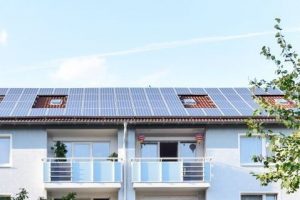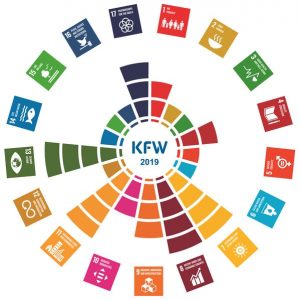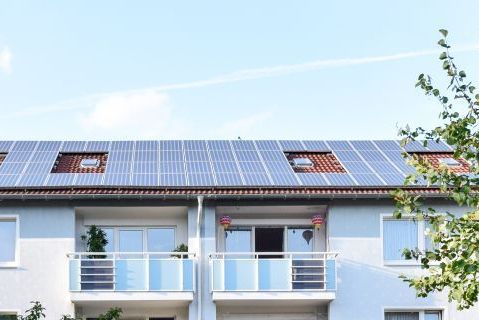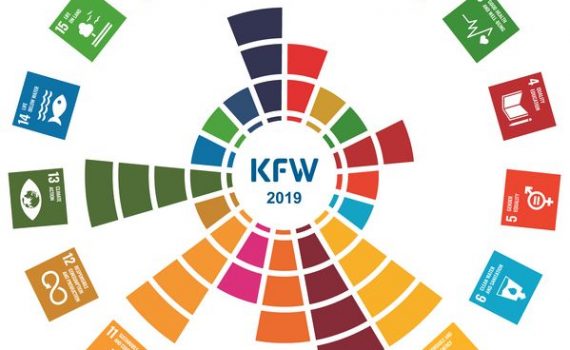 With the gradual dismantling of ten particularly climate-damaging subsidies in the energy, transport and agricultural sectors, Germany could generate up to 46 billion euros in revenue annually. This is the result of a new study by the "Forum Ökologisch-Soziale Marktwirtschaft" commissioned by Greenpeace.
With the gradual dismantling of ten particularly climate-damaging subsidies in the energy, transport and agricultural sectors, Germany could generate up to 46 billion euros in revenue annually. This is the result of a new study by the "Forum Ökologisch-Soziale Marktwirtschaft" commissioned by Greenpeace.
Kategorie für Blog: Environmental policy
 "In key policy areas, it is not enough to take additional steps; instead, a fundamental transformation must be initiated - the Federal Government recognises this with its dialogue version of the German Sustainability Strategy. The momentum for this transformation is now, and it needs tailwind from all ministries," explained Dr. Werner SchnappaufChairman of the German Council for Sustainable Development (RNE). "The version of the dialogue brings important innovations that will allow the policies of the coming years to be more closely aligned with the guiding principle of sustainability. The designation of transformation areas such as the energy and transport transition or the transition to a circular economy is an important step forward. At the same time, we believe that there is still room for improvement in some areas," said Schnappauf.
"In key policy areas, it is not enough to take additional steps; instead, a fundamental transformation must be initiated - the Federal Government recognises this with its dialogue version of the German Sustainability Strategy. The momentum for this transformation is now, and it needs tailwind from all ministries," explained Dr. Werner SchnappaufChairman of the German Council for Sustainable Development (RNE). "The version of the dialogue brings important innovations that will allow the policies of the coming years to be more closely aligned with the guiding principle of sustainability. The designation of transformation areas such as the energy and transport transition or the transition to a circular economy is an important step forward. At the same time, we believe that there is still room for improvement in some areas," said Schnappauf.
 From 1 January 2021, climate-damaging fossil fuels will be subject to a price of 25 euros per tonne of CO2 is proven. This means that oil and diesel will become more expensive by 7.9 cents per litre, petrol by 7 cents per litre and natural gas by 0.6 cents per kilowatt hour. Citizens will be relieved of the additional costs, among other things, by a reduction in the price of electricity. The amendment, which had already been passed by the Bundestag on Thursday, also passed the Bundesrat today. The Fuel Emission Trading Act (BEHG) is designed to reduce CO2-price in the form of national certificate trading for the heating and transport sectors.
From 1 January 2021, climate-damaging fossil fuels will be subject to a price of 25 euros per tonne of CO2 is proven. This means that oil and diesel will become more expensive by 7.9 cents per litre, petrol by 7 cents per litre and natural gas by 0.6 cents per kilowatt hour. Citizens will be relieved of the additional costs, among other things, by a reduction in the price of electricity. The amendment, which had already been passed by the Bundestag on Thursday, also passed the Bundesrat today. The Fuel Emission Trading Act (BEHG) is designed to reduce CO2-price in the form of national certificate trading for the heating and transport sectors.
 Glaciers are melting, sea levels are rising, heat waves and heavy rainfall are increasing: The consequences of climate change are visible and tangible worldwide, and the window of opportunity to act is shrinking. In order to significantly limit the global effects of climate change, the emission of greenhouse gases on earth must be drastically reduced. The agreement reached by the international community in Paris in 2015 sets the goal of limiting global warming to well below 2 degrees Celsius, but preferably to 1.5 degrees Celsius. Now, the Wuppertal Institute presented a study with possible cornerstones that can help to achieve the 1.5 degree target by 2035. The study shows that a climate-neutral energy system by 2035 is very ambitious, but in principle feasible, provided that all possible strategies from today's perspective are bundled. This requires, above all, bringing forward and intensifying measures that are described in many studies as necessary to achieve greenhouse gas neutrality by 2050.
Glaciers are melting, sea levels are rising, heat waves and heavy rainfall are increasing: The consequences of climate change are visible and tangible worldwide, and the window of opportunity to act is shrinking. In order to significantly limit the global effects of climate change, the emission of greenhouse gases on earth must be drastically reduced. The agreement reached by the international community in Paris in 2015 sets the goal of limiting global warming to well below 2 degrees Celsius, but preferably to 1.5 degrees Celsius. Now, the Wuppertal Institute presented a study with possible cornerstones that can help to achieve the 1.5 degree target by 2035. The study shows that a climate-neutral energy system by 2035 is very ambitious, but in principle feasible, provided that all possible strategies from today's perspective are bundled. This requires, above all, bringing forward and intensifying measures that are described in many studies as necessary to achieve greenhouse gas neutrality by 2050.
"Solar energy is a fundamental pillar of the energy transition. In order to further support this and to achieve our goal - a complete power supply from renewable energies by 2030 - we are further expanding our successful solar offensive: In addition to expanding the solar storage programme, which is in high demand, we are currently developing a solar register for Rhineland-Palatinate. In addition, we will also promote solar carports, balcony plug-in modules, wall boxes or agro-PV projects in the future," announced Environment and Energy Minister Ulrike Höfken during the event under the motto "Solar Offensive Rhineland-Palatinate: Investments for Climate and Economy" as part of the series "Wednesdays at the MUEEF" in Mainz today. Together with guests from the solar industry, nature conservation and citizen energy, she discussed the opportunities of solar energy for the state, for example through the economic factor of the Solar Offensive or cooperative PV projects.
 Hydrogen is an important alternative for sectors stuck in the fossil fuel economy. As national governments and European parliamentarians negotiate the EU's hydrogen strategy, EASAC issues a new commentary. "Hydrogen can help reduce our dependence on fossil fuels," says William Gillett, Director of EASAC's Energy Programme. "But the climate benefits are limited if we use fossil fuels to produce it - even with carbon capture and storage. The EU must put an end to fossil fuel subsidies. The rapidly growing demand for hydrogen must be met by a massive increase in electricity generation from renewables, together with certified imports from third countries."
Hydrogen is an important alternative for sectors stuck in the fossil fuel economy. As national governments and European parliamentarians negotiate the EU's hydrogen strategy, EASAC issues a new commentary. "Hydrogen can help reduce our dependence on fossil fuels," says William Gillett, Director of EASAC's Energy Programme. "But the climate benefits are limited if we use fossil fuels to produce it - even with carbon capture and storage. The EU must put an end to fossil fuel subsidies. The rapidly growing demand for hydrogen must be met by a massive increase in electricity generation from renewables, together with certified imports from third countries."
 "Solar energy is a fundamental pillar of the energy transition. In order to further support this and to achieve our goal - a complete power supply from renewable energies by 2030 - we are further expanding our successful solar offensive: In addition to expanding the solar storage programme, which is in high demand, we are currently developing a solar register for Rhineland-Palatinate. In addition, we will also promote solar carports, balcony plug-in modules, wall boxes or agro-PV projects in the future," announced Environment and Energy Minister Ulrike Höfken during the event under the motto "Solar Offensive Rhineland-Palatinate: Investments for Climate and Economy" as part of the series "Wednesdays in the MUEEF" in Mainz today.
"Solar energy is a fundamental pillar of the energy transition. In order to further support this and to achieve our goal - a complete power supply from renewable energies by 2030 - we are further expanding our successful solar offensive: In addition to expanding the solar storage programme, which is in high demand, we are currently developing a solar register for Rhineland-Palatinate. In addition, we will also promote solar carports, balcony plug-in modules, wall boxes or agro-PV projects in the future," announced Environment and Energy Minister Ulrike Höfken during the event under the motto "Solar Offensive Rhineland-Palatinate: Investments for Climate and Economy" as part of the series "Wednesdays in the MUEEF" in Mainz today.
"The world's water resources are currently facing the greatest threat in the history of mankind," write aquatic ecologists in their recently published statement paper. More than one hundred professional societies of aquatic ecosystem research around the globe have signed the joint statement. In it, the researchers show the dramatic effects that climate change is having on aquatic ecosystems worldwide. They call for immediate concerted action by politics, business, science and society to halt the progress of climate change.
 As stated by EU Commission President Ursula von der Leyen in her State of the Union address announced, the European Commission today (Thursday) proposed that EU greenhouse gas emissions should fall by at least 55 percent by 2030 compared to 1990 levels. The previous target was 40 percent. The new target is based on a comprehensive impact assessment of the social, economic and environmental consequences. This shows that 55 percent less emissions is realistic and feasible. The new climate target will help support Europe's economic recovery from the coronavirus pandemic. It also demonstrates the EU's global leadership in the run-up to the next UN climate conference (COP26).
As stated by EU Commission President Ursula von der Leyen in her State of the Union address announced, the European Commission today (Thursday) proposed that EU greenhouse gas emissions should fall by at least 55 percent by 2030 compared to 1990 levels. The previous target was 40 percent. The new target is based on a comprehensive impact assessment of the social, economic and environmental consequences. This shows that 55 percent less emissions is realistic and feasible. The new climate target will help support Europe's economic recovery from the coronavirus pandemic. It also demonstrates the EU's global leadership in the run-up to the next UN climate conference (COP26).
CO2-Emissions should be reduced by 65 percent over the next ten years compared to 1990 in order to achieve climate neutrality - Energy system must be converted to 100 percent renewable energies by 2040 - Investment of 3,000 billion euros required to meet European Green Deal and Paris climate targets - German EU Council Presidency can ensure that Corona aid packages link economic stimulus with climate protection
Climate protection is important to over 80 percent of Germans - but this should not be reflected in higher rental costs. In order to increase the acceptance of energy-efficient renovations, Deutsche Wohnen has developed a model of how climate protection and social compatibility can come together. The "Concept for Socially Compatible Climate Protection in the Building Sector" aims to significantly increase the rate of refurbishment in existing buildings in order to achieve national climate protection targets. At the same time, an economic stimulus package worth billions is being initiated.
 30.06.2020 - 16 players in the German financial sector, with assets of more than €5.5 trillion and over 46 million customer connections in Germany, have signed a voluntary commitment to align their loan and investment portfolios in line with the goals of the Paris Climate Agreement. Through the agreed measurement, publication and target setting to reduce the emissions associated with the loan and investment portfolios, the financial sector intends to make a contribution to climate protection and support the sustainable and future-oriented further development of the economy. This brings the German financial centre one step closer to the goal set by the German government at the beginning of 2019 of making Germany one of the leading locations for sustainable finance.
30.06.2020 - 16 players in the German financial sector, with assets of more than €5.5 trillion and over 46 million customer connections in Germany, have signed a voluntary commitment to align their loan and investment portfolios in line with the goals of the Paris Climate Agreement. Through the agreed measurement, publication and target setting to reduce the emissions associated with the loan and investment portfolios, the financial sector intends to make a contribution to climate protection and support the sustainable and future-oriented further development of the economy. This brings the German financial centre one step closer to the goal set by the German government at the beginning of 2019 of making Germany one of the leading locations for sustainable finance.
 At the proposal of the Federal Environment Ministry, the Federal Cabinet adopted the third German Resource Efficiency Programme (ProgRess III) on 17 June 2020. With this programme, the government aims to achieve an economical use of raw materials. Companies in particular are to use natural resources more efficiently along the entire value chain. Greater use is to be made of digital solutions to increase resource efficiency. The decision in favour of resource-saving products is to be made easier for citizens through improved information.
At the proposal of the Federal Environment Ministry, the Federal Cabinet adopted the third German Resource Efficiency Programme (ProgRess III) on 17 June 2020. With this programme, the government aims to achieve an economical use of raw materials. Companies in particular are to use natural resources more efficiently along the entire value chain. Greater use is to be made of digital solutions to increase resource efficiency. The decision in favour of resource-saving products is to be made easier for citizens through improved information.
Am 20. Juni ist kalendarischer Sommeranfang und vielerorts sind schon jetzt Trockenheit und niedrige Wasserstände in den Flüssen an der Tagesordnung, die Gewässer in Deutschland sind nicht gegen die Auswirkungen des Klimawandels gerüstet. Angesichts der verheerenden Zustände vieler Gewässer in Deutschland fordert der BUND einen Paradigmenwechsel im Umgang mit unseren Gewässern: Oberstes Prinzip in Zeiten des Klimawandels muss sein, Wasser in der Landschaft zu halten und Bächen und Flüssen ihre natürliche Dynamik innerhalb ihrer Auen zurückzugeben. Nur knapp acht Prozent der Flüsse und Bäche in Deutschland erreichen den von der europäischen Wasserrahmenrichtlinie geforderten guten ökologischen Zustand. Knapp 40 Prozent der oberirdischen Gewässer sind europaweit durch vielfältige Stressoren wie Klimawandel, Nährstoffeinträge durch die Landwirtschaft oder Begradigungen belastet. "Wir heizen die Erde weiter auf, gleichzeitig entwässern wir die Landschaft. Deshalb ist es keine Überraschung, dass es unseren heimischen Gewässern so schlecht geht", betont Olaf Bandt, Vorsitzender des BUND, mit Blick auf eine aktuelle Auswertung des BUND zu den Auswirkungen des Klimawandels auf Gewässer.
On 18 June 2020, the German Bundestag passed the Building Energy Act (GEG) in its third reading. With this law, the federal government is combining the existing requirements of the Energy Saving Ordinance (EnEV), the Renewable Energies Heat Act (EEWärmeG) and the Energy Saving Act (EnEG). For the information programme Zukunft Altbau (Future of Old Buildings), which is supported by the Baden-Württemberg Ministry of the Environment, the specifications of the new law are not ambitious enough. To bring climate-friendly building and renovation nationwide on the way is not possible in the future. "The legislator has missed it to introduce more demanding standards," says Frank Hettler of Zukunft Altbau. "For a sustainable building stock in Germany, however, these are urgently needed to achieve the climate targets." The GEG will now be forwarded to the Bundesrat, which, however, does not require approval, and is expected to come into force by the end of the year.
 Zur heutigen Kabinettssitzung und der dabei geplanten Befassung mit dem Entwurf eines Deutschen Ressourceneffizienzprogramms III (ProgRess III) erklären Dieter Janecek, Sprecher für Industriepolitik und digitale Wirtschaft, und Dr. Bettina Hoffmann, Sprecherin für Umweltpolitik und Umweltgesundheit:
Mit ProgRess III tritt die Bundesregierung auf der Stelle. Zwei Ressourceneffizenzprogramme der Bundesregierung konnten nicht verhindern, dass der deutsche Rohstoffverbrauch weiterhin steigt. Es ist absehbar, dass auch das dritte Ressourcenprogramm der Bundesregierung daran nichts ändert. Auch ProgRess III bleibt ein längliches Sammelsurium von Plänen, Ankündigungen und Prüfaufträgen.
Zur heutigen Kabinettssitzung und der dabei geplanten Befassung mit dem Entwurf eines Deutschen Ressourceneffizienzprogramms III (ProgRess III) erklären Dieter Janecek, Sprecher für Industriepolitik und digitale Wirtschaft, und Dr. Bettina Hoffmann, Sprecherin für Umweltpolitik und Umweltgesundheit:
Mit ProgRess III tritt die Bundesregierung auf der Stelle. Zwei Ressourceneffizenzprogramme der Bundesregierung konnten nicht verhindern, dass der deutsche Rohstoffverbrauch weiterhin steigt. Es ist absehbar, dass auch das dritte Ressourcenprogramm der Bundesregierung daran nichts ändert. Auch ProgRess III bleibt ein längliches Sammelsurium von Plänen, Ankündigungen und Prüfaufträgen.
The parliament of Bremen wants to oblige the use of solar energy on all new and existing buildings in Bremen and Bremerhaven. Whenever the roof surface is completely renewed, they are to be equipped with a solar system in the future. This is photovoltaics and, if necessary, also solar thermal energy. The Senate is currently examining the latter.
Lecture "Can we build our way out of the climate crisis?" from 16 April 2020
Among other things, Schellnhuber calls for "prompt measures to achieve the two-degree target, above all by switching from fossil to renewable energy sources and replacing finite building materials with wood and renewable raw materials."
State government launches climate protection support programme for citizens
Environment Minister Jan Philipp Albrecht today presented the state's new funding programme for private investment in climate protection. It starts on Tuesday, 9 June, and includes a bundle of support measures. Funding is available for the purchase of cargo bikes, e-charging stations, electricity storage systems, photovoltaic balcony systems, solar thermal systems, non-fossil heating systems and rainwater cisterns. The installation of a district heating connection and the installation of a green roof are also subsidised.Council of Ministers approves bill to amend state building code
In its meeting on 26 May 2020, the Rhineland-Palatinate Council of Ministers approved in principle a draft bill to amend, among other things, the Rhineland-Palatinate Building Code. The amendment of the state building code is intended to implement changes to the so-called model building code that have already been adopted or are in preparation. The Federal Chamber of Architects (BAK) and the Federal Foundation of Baukultur presented their proposal for a "Baukultur Innovation Programme" to politicians in Berlin today on behalf of the planning and construction industry.
Anne Katrin Bohle, State Secretary at the Federal Ministry of the Interior, Building and Community, accepted the four-point plan. In it, the authors suggest measures to overcome the coronavirus crisis that will have a lasting economic and social impact.
The Federal Chamber of Architects (BAK) and the Federal Foundation of Baukultur presented their proposal for a "Baukultur Innovation Programme" to politicians in Berlin today on behalf of the planning and construction industry.
Anne Katrin Bohle, State Secretary at the Federal Ministry of the Interior, Building and Community, accepted the four-point plan. In it, the authors suggest measures to overcome the coronavirus crisis that will have a lasting economic and social impact.
 Environment Minister Franz Untersteller reacted with relief to the agreement reached yesterday by the coalition on the amendment of the Climate Protection Act. The law is to be passed by the state parliament before the summer break and will then replace the previous climate protection law from 2013.
Environment Minister Franz Untersteller reacted with relief to the agreement reached yesterday by the coalition on the amendment of the Climate Protection Act. The law is to be passed by the state parliament before the summer break and will then replace the previous climate protection law from 2013.
 Berlin/Cologne. Climate protection and adaptation to the consequences of climate change will become increasingly important for cities. This is one of the findings of the survey of (Lord) Mayors of large German cities* conducted by the German Institute of Urban Affairs in January and February 2020. Almost two-thirds of the respondents named climate protection as an important municipal issue for the future. This means that the number of mayors who attribute an increase in importance to this field of municipal policy action has more than tripled compared to the previous year. Future surveys will show how strongly this result was influenced by the protests of the 'Fridays for Future' movement.
Berlin/Cologne. Climate protection and adaptation to the consequences of climate change will become increasingly important for cities. This is one of the findings of the survey of (Lord) Mayors of large German cities* conducted by the German Institute of Urban Affairs in January and February 2020. Almost two-thirds of the respondents named climate protection as an important municipal issue for the future. This means that the number of mayors who attribute an increase in importance to this field of municipal policy action has more than tripled compared to the previous year. Future surveys will show how strongly this result was influenced by the protests of the 'Fridays for Future' movement.
 Brussels/Freiburg, 5 May 2020 - An alliance "Solar Europe Now", officially launched on 5 May, is calling for solar energy to be recognised as a key technology for the objectives of the European Green Deal. The new alliance, which currently includes more than 90 players from the entire value chain of the European solar industry, is concerned that the photovoltaic sector is not being given enough consideration in the current presentation of the Green Deal.
Brussels/Freiburg, 5 May 2020 - An alliance "Solar Europe Now", officially launched on 5 May, is calling for solar energy to be recognised as a key technology for the objectives of the European Green Deal. The new alliance, which currently includes more than 90 players from the entire value chain of the European solar industry, is concerned that the photovoltaic sector is not being given enough consideration in the current presentation of the Green Deal.
 In Vienna, as a rule, no residential building may be erected without a solar system in the future. This is stipulated in an amendment to the building code, which is currently being evaluated, the red-green city government informed on Monday. Currently, such a photovoltaic obligation applies only to industrial buildings.
In Vienna, as a rule, no residential building may be erected without a solar system in the future. This is stipulated in an amendment to the building code, which is currently being evaluated, the red-green city government informed on Monday. Currently, such a photovoltaic obligation applies only to industrial buildings.
 Eine Studie des Forums Ökologisch-Soziale Marktwirtschaft im Auftrag von Greenpeace (März 2020).
Durch die Corona-Krise wird der Staat Soforthilfen und weitreichende Konjunkturmaßnahmen historischen Ausmaßes umsetzen. Während Gesundheit und die kurzfristige Unterstützung von Arbeitnehmer*innen und Unternehmen in den Fokus rücken, dürfen die Fehler vergangener Wirtschaftskrisen nicht wiederholt werden. Die geplanten Hilfen für einen wirtschaftlichen Neustart können die Weichen stellen für die notwendige Transformation. Anhand einiger Beispiele wird illustriert, wie kurzfristige wirtschaftliche Unterstützung mit langfristigen gesellschaftlichen Prioritäten in Einklang gebracht werden können.
Eine Studie des Forums Ökologisch-Soziale Marktwirtschaft im Auftrag von Greenpeace (März 2020).
Durch die Corona-Krise wird der Staat Soforthilfen und weitreichende Konjunkturmaßnahmen historischen Ausmaßes umsetzen. Während Gesundheit und die kurzfristige Unterstützung von Arbeitnehmer*innen und Unternehmen in den Fokus rücken, dürfen die Fehler vergangener Wirtschaftskrisen nicht wiederholt werden. Die geplanten Hilfen für einen wirtschaftlichen Neustart können die Weichen stellen für die notwendige Transformation. Anhand einiger Beispiele wird illustriert, wie kurzfristige wirtschaftliche Unterstützung mit langfristigen gesellschaftlichen Prioritäten in Einklang gebracht werden können.
While the emergency aid for companies is getting underway, the debate about possible post-crisis economic stimulus packages is also gaining momentum. The German Green Business Association is proposing a transformation fund to combine a new start for the economy with social aspects and environmental and climate protection.
 Sustainable development is hardly conceivable without a consistent circular economy. Turning away from a predominantly linear economy requires a change of course. UBA has drawn up guiding principles for politics, business and society which systematically set out the objectives, scope for action, standards of action, requirements and success factors of a circular economy.
Sustainable development is hardly conceivable without a consistent circular economy. Turning away from a predominantly linear economy requires a change of course. UBA has drawn up guiding principles for politics, business and society which systematically set out the objectives, scope for action, standards of action, requirements and success factors of a circular economy.
 From the meeting of the Senate on 10 March 2020:
The Senate today adopted a comprehensive catalogue of measures to accelerate the expansion of solar energy in Berlin, following a proposal by the Senator for Economics, Energy and Public Enterprises, Ramona Pop.
Senator Pop: "The potential study for the Solarcity Masterplan has shown that we can harvest 25 per cent of the electricity generated with solar energy from Berlin's rooftops. We must therefore accelerate the expansion of solar energy in the city. It is necessary for the federal government to finally improve the legal framework for solar energy in cities. Nevertheless, we want to actively utilise the available scope at state level. With the Solarcity Masterplan, we will expand information and advice, provide incentives and also examine regulatory instruments. The implementation of the Solarcity Masterplan is a joint task for the Senate, but also for all Berlin stakeholders from business and society."
From the meeting of the Senate on 10 March 2020:
The Senate today adopted a comprehensive catalogue of measures to accelerate the expansion of solar energy in Berlin, following a proposal by the Senator for Economics, Energy and Public Enterprises, Ramona Pop.
Senator Pop: "The potential study for the Solarcity Masterplan has shown that we can harvest 25 per cent of the electricity generated with solar energy from Berlin's rooftops. We must therefore accelerate the expansion of solar energy in the city. It is necessary for the federal government to finally improve the legal framework for solar energy in cities. Nevertheless, we want to actively utilise the available scope at state level. With the Solarcity Masterplan, we will expand information and advice, provide incentives and also examine regulatory instruments. The implementation of the Solarcity Masterplan is a joint task for the Senate, but also for all Berlin stakeholders from business and society."
 Konturen einer solidarischen Stadtpolitik
Anton Brokow-Loga (Hrsg.),
Frank Eckardt (Hrsg.)
Städte ohne Wachstum – eine bislang kaum vorstellbare Vision. Doch Klimawandel,
Ressourcenverschwendung, wachsende soziale Ungleichheiten und viele andere
Zukunftsgefahren stellen das bisherige Allheilmittel Wachstum grundsätzlich infrage. Wie wollen
wir heute und morgen zusammenleben? Wie gestalten wir ein gutes Leben für alle in der Stadt?
Konturen einer solidarischen Stadtpolitik
Anton Brokow-Loga (Hrsg.),
Frank Eckardt (Hrsg.)
Städte ohne Wachstum – eine bislang kaum vorstellbare Vision. Doch Klimawandel,
Ressourcenverschwendung, wachsende soziale Ungleichheiten und viele andere
Zukunftsgefahren stellen das bisherige Allheilmittel Wachstum grundsätzlich infrage. Wie wollen
wir heute und morgen zusammenleben? Wie gestalten wir ein gutes Leben für alle in der Stadt?
- Over EUR 28 billion for "climate protection measures": KfW is one of the most important supporters of the Paris climate goals
- Promotional bank is a global pioneer with its standardised SDG mapping
- Strong international interest in KfW SDG mapping
 KfW is today publishing the results of the SDG mapping of new commitments throughout the Group in 2019. In order to clarify the individual contribution made by KfW's new commitments to achieving the UN Sustainable Development Goals, KfW has developed a standardised procedure: 1,500 indicators are used each year to determine to which SDGs KfW's new commitments can be assigned. This makes the contribution transparent at both group and business sector level.
KfW is today publishing the results of the SDG mapping of new commitments throughout the Group in 2019. In order to clarify the individual contribution made by KfW's new commitments to achieving the UN Sustainable Development Goals, KfW has developed a standardised procedure: 1,500 indicators are used each year to determine to which SDGs KfW's new commitments can be assigned. This makes the contribution transparent at both group and business sector level.With retroactive effect from 1 January 2020, the timber construction subsidy in Hamburg has now officially been increased to EUR 0.80 per kilogramme of timber product as part of the various subsidised housing construction programmes. As a prerequisite for the subsidy,...
Thuringia is making six million euros available this year for investments in municipal climate protection. The funding comes from the state's "Klima Invest" programme, which has already provided more than 15.5 million euros in investments in municipalities since the beginning of 2018, as the Ministry of the Environment announced in Erfurt on Thursday. 312 applications for funding have been approved.
 27.01.2020 A material revolution that replaces cement and steel with wood in urban construction can have double benefits for climate stabilization. This is now shown in a study by an international team of scientists. First, it can avoid greenhouse gas emissions from cement and steel production. Secondly, it can turn buildings into carbon sinks, since in the construction timber the CO2 is stored. Although the required amount of wood is theoretically available, such an expansion would require very careful sustainable forest management, the authors emphasize.
27.01.2020 A material revolution that replaces cement and steel with wood in urban construction can have double benefits for climate stabilization. This is now shown in a study by an international team of scientists. First, it can avoid greenhouse gas emissions from cement and steel production. Secondly, it can turn buildings into carbon sinks, since in the construction timber the CO2 is stored. Although the required amount of wood is theoretically available, such an expansion would require very careful sustainable forest management, the authors emphasize.
This week, the German cabinet plans to adopt the draft bill on the coal phase-out law. However, the roadmap for the shutdown of coal-fired power plants that is to be voted on deviates in several places from the coal compromise reached last year. The Solar Cluster Baden-Württemberg points this out and demands considerable improvements. According to the draft law, carbon dioxide emissions will be reduced significantly less than agreed in the first ten years: By 2030, only five gigawatts instead of 20 gigawatts of power are to be switched off. In addition, the number of CO2 allowances will not fall to the same extent as coal-fired power generation.
150 concrete proposals are contained in a catalogue that the city of Bonn has drawn up in recent months following the declaration of the climate emergency. Many of the measures can be implemented directly by the administration, while others require a political decision. At a press conference on Wednesday, 22 January 2020, Lord Mayor Ashok Sridharan and City Planning Officer Helmut Wiesner presented the catalogue of measures. On 4 July 2019, Bonn City Council decided to support a resolution to declare a climate emergency. Bonn has thus joined other municipalities and reaffirmed that climate protection must be a top priority in municipal action. The administration has therefore drawn up a catalogue of measures over the past few months with the involvement of all departments.
























